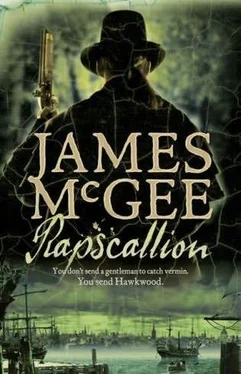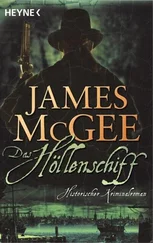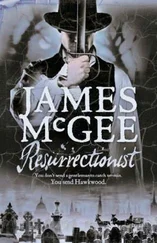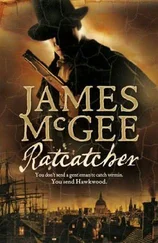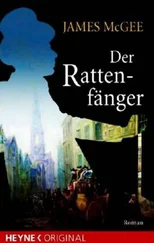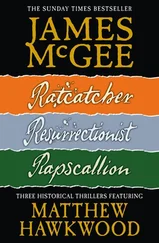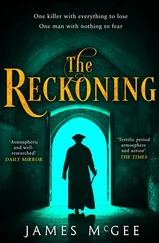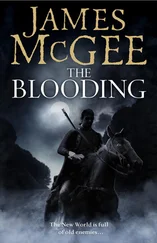James McGee - Rapscallion
Здесь есть возможность читать онлайн «James McGee - Rapscallion» — ознакомительный отрывок электронной книги совершенно бесплатно, а после прочтения отрывка купить полную версию. В некоторых случаях можно слушать аудио, скачать через торрент в формате fb2 и присутствует краткое содержание. Жанр: Исторический детектив, на английском языке. Описание произведения, (предисловие) а так же отзывы посетителей доступны на портале библиотеки ЛибКат.
- Название:Rapscallion
- Автор:
- Жанр:
- Год:неизвестен
- ISBN:нет данных
- Рейтинг книги:3 / 5. Голосов: 1
-
Избранное:Добавить в избранное
- Отзывы:
-
Ваша оценка:
- 60
- 1
- 2
- 3
- 4
- 5
Rapscallion: краткое содержание, описание и аннотация
Предлагаем к чтению аннотацию, описание, краткое содержание или предисловие (зависит от того, что написал сам автор книги «Rapscallion»). Если вы не нашли необходимую информацию о книге — напишите в комментариях, мы постараемся отыскать её.
Rapscallion — читать онлайн ознакомительный отрывок
Ниже представлен текст книги, разбитый по страницам. Система сохранения места последней прочитанной страницы, позволяет с удобством читать онлайн бесплатно книгу «Rapscallion», без необходимости каждый раз заново искать на чём Вы остановились. Поставьте закладку, и сможете в любой момент перейти на страницу, на которой закончили чтение.
Интервал:
Закладка:
They had been making good time until Wooten, but then the journey had taken a turn for the worse. The roads had become little more than narrow winding tracks, barely wide enough for a wagon, forcing them to ride in single file. Some stretches had taken them across moonlit fields. Hawkwood suspected it might have been quicker riding all the way to Dover and then taking the main road north, but Jago had argued that their chosen path was five miles shorter.
They entered Deal through the toll gate on the western end of the town. They could tell by the lights and the frantic activity that they were too late. In truth, Hawkwood had suspected that would be the case from the moment they had left the ashes of the farmhouse.
True to his promise, Morgan had taken his revenge. In doing so, he had left a trail of death and destruction behind him.
The attack had not been subtle. If Morgan's only intention had been to instil fear and confusion, then he had succeeded admirably. Six wagons and more than two dozen men had taken part in the assault on the Admiral's residency. The handsome two-storeyed building with its large windows either side of a pillared and porticoed entrance didn't look like the sort of place where bullion was stored. To the right of the pillars stood a manned sentry box. A pair of heavy doors formed an effective barrier to the street. Or at least they had done. Morgan's attack had left them hanging from their hinges, blown apart by twelve-pound shot fired from a 6-cwt carronade that had been mounted on the heavy horse-drawn, flat-bedded wagon that was now parked at an oblique angle across the road.
The carronade was an effective weapon, short-barrelled, utilizing a variety of calibres — of which the twelve-pounders were the smallest — but it had its flaws. One being that it was prone to violent recoil. The stubby, nozzled tube of metal resting on its side next to the wagon told its own tale.
A four-man military guard stood watch over the gun and the two horses, now waiting placidly in their harnesses.
"Nathaniel, you and Micah have a word with the guards," Hawkwood said. "See what you can find out. Captain Lasseur and I will pay our compliments to the Admiral."
Jago looked Hawkwood and Lasseur up and down. "That's if he doesn't have you both arrested for vagrancy first."
After running a gauntlet of curious stares, Hawkwood's warrant got them through the door and into a cold marble- floored room with an impressive domed ceiling, where a harassed army lieutenant called Burden identified himself as the officer in charge of the bullion escort. He and his troops had been in their quarters in the castle when Morgan launched his assault.
Rear Admiral Foley had not been in residence at the time, Burden explained. A galloper had been sent to Dover, where he was attending a meeting with his fellow Port Admirals, to inform him of the night's events.
"Who was in the residency?" Hawkwood asked.
Hawkwood could tell that Burden was still wondering who he was, but the warrant gave him the authority to ask questions, and Burden knew it, irrespective of the fact that Hawkwood looked like the bastard son of a low-class bordello keeper and the town drunkard.
There had been six people in the house: the admiral's secretary, the cook, the housekeeper and three armed guards, who rotated shifts in the sentry box under the portico. The unfortunate sentry manning the box when the carronade round demolished the entrance doors had been Private Hobley. His body had been found, face down and badly mutilated, twenty feet from the entrance. It was still lying there now, awaiting removal to the dead room next to the castle's infirmary, where it would join the night's other casualties.
Throughout his report, Burden kept casting surreptitious looks in Lasseur's direction. The Frenchman had remained silent thus far, but Burden's interest had been piqued; no doubt because Lasseur, with his goatee beard, didn't have the look of an Englishman. And, like Hawkwood, he was bloodied and bruised and reeked of smoke.
To satisfy Burden's curiosity, Hawkwood introduced Lasseur by name but described him as a Bourbon loyalist officer on special detachment to the Home Office. He could see that Burden wasn't entirely satisfied with the explanation, but that was something the lieutenant would just have to live with.
Then Burden said to Lasseur, "You'll have to forgive me, Captain, but after what we've seen tonight, my men and I ain't feeling too well disposed to your countrymen."
"What are you talking about?" Hawkwood asked.
Burden gazed at him in puzzlement. "You mean, you don't know?"
"Know what?"
"It was a French raiding party that did this."
Hawkwood felt cold fingers caress the back of his neck.
Burden explained, with another sideways glance at Lasseur, that the men who'd invaded the residency had been wearing French infantry uniforms.
"They killed two of my men, the murdering bastards," Burden said, unable to keep the anguish from his voice.
In addition to the sentry, Corporal Jefford, one of the guards stationed in the inner lobby, had been killed. His body was lying next to Hobley's, under the same blanket.
The lieutenant in charge had spoken in English, summoning all the building's occupants to assemble before him. Then he had demanded the key to the strong room. The admiral's secretary, the individual entrusted with the safety of the key in his master's absence, had, in a laudable but ultimately futile display of defiance, refused to comply. At which point, one of the lieutenant's men, a short, broad-shouldered sergeant somewhat older than his comrades, had shot Corporal Jefford stone dead.
The key had been produced within minutes.
And then the raiding party had commenced emptying the strong room.
It had taken some time to remove the bullion boxes, but the Frenchmen had worked with quiet, speedy efficiency. According to the surviving guard, Private Butcher, it looked as if it was something they did every day.
When the last box had been taken, the lieutenant had locked the staff in the strong room. He and his men had then departed with the bullion.
"Where was the army?" Hawkwood demanded. "What the devil were you doing while all this was going on?"
The army, Burden told him miserably, had been outmanoeuvred.
Following a tip-off that two major contraband runs involving hundreds of men and ponies were planned for that evening — one to the north at Sandwich Flats, the other to the south at Margaret's Bay — the Revenue had turned to the town's regular contingent of troops, modest at the best of times, for assistance. Only a handful of soldiers had been left in Deal.
Hawkwood realized then how well Morgan had played his cards. He had obviously started the rumours himself, instructing his agents to spread the word the runs were taking place. With the troops out of the way, his men had soon sealed off the town's three major access roads: the Dover Road to the south, Five Bell Lane in the west and the turnpike road to the north.
Burden coloured. "And we were stuck in the bloody castle. We were able to return fire, but I'm still not sure if we hit any of them."
Deal Castle lay at the southern edge of the town, close to the Dover Road toll gate. It had been besieged once before, during the Civil War. Since then it had remained inviolate, its massive circular bastions standing guard over the town and the coast, a monument to Tudor engineering.
Like the carronade, however, the fortress had its flaws. Its primary use was as a defence against attack from the water, not from the land. Its guns faced the sea. The second major flaw was that, like all castles, it had only one main entrance: the gatehouse.
Access to the gatehouse was by a narrow stone causeway. Morgan's men had turned the causeway into a killing ground, blockading it with another of their heavy wagons and a pair of mounted swivel guns opposite the entrance.
Читать дальшеИнтервал:
Закладка:
Похожие книги на «Rapscallion»
Представляем Вашему вниманию похожие книги на «Rapscallion» списком для выбора. Мы отобрали схожую по названию и смыслу литературу в надежде предоставить читателям больше вариантов отыскать новые, интересные, ещё непрочитанные произведения.
Обсуждение, отзывы о книге «Rapscallion» и просто собственные мнения читателей. Оставьте ваши комментарии, напишите, что Вы думаете о произведении, его смысле или главных героях. Укажите что конкретно понравилось, а что нет, и почему Вы так считаете.
